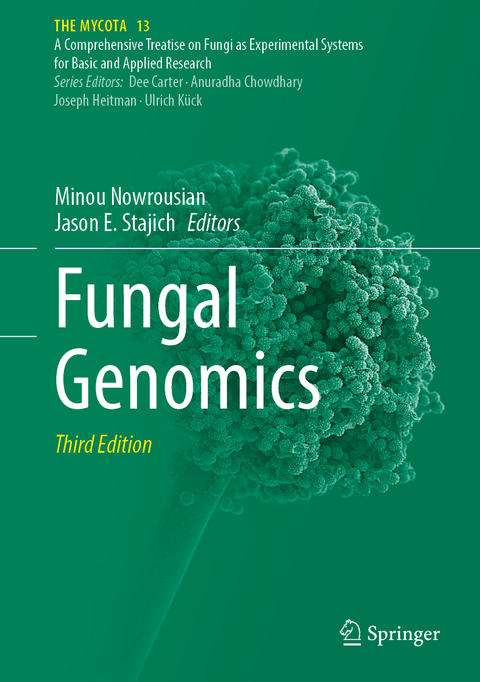
Fungal Genomics
Springer International Publishing (Verlag)
978-3-031-75665-8 (ISBN)
- Noch nicht erschienen - erscheint am 23.01.2025
- Versandkostenfrei innerhalb Deutschlands
- Auch auf Rechnung
- Verfügbarkeit in der Filiale vor Ort prüfen
- Artikel merken
This fully revised 3rd edition of Fungal Genomics highlights the impact of genomics on the field of fungal biology in four sections:
- Part I Genome Sequences and Beyond: Examines the impact of genome-based information and techniques on research ranging from the discovery of giant transposons to the analysis of less-studied extremotolerant fungi as well as studies of three-dimensional chromatin organization in fungi.
- Part II Cell and Developmental Biology: Explores advances in high-throughput genetics/genomics and RNA editing in fungi, the role of codons in gene regulation, and the analysis of epigenetic regulation in early-diverging fungi.
- Part III Biotechnology: Covers the search for plant biomass-converting enzymes in fungal genomes and work with industrially important fungi.
- Part IV Interactions - Symbioses, Mutualisms, and Pathogens: Explains the genomic analysis of the emerging human pathogen Candida auris as well as genomic signatures in ectomycorrhizal fungi.
This book is a must-read for anyone interested in the exciting field of fungal genomics.
Minou Nowrousian earned her diploma and Ph.D. in biology at the Ruhr-University Bochum in the laboratory of Dr. Ulrich Kück working in molecular biology of fungi. During her postdoc at Dartmouth Medical School in the laboratory of Dr. Jay Dunlap and Dr. Jennifer Loros, she worked on circadian rhythms in Neurospora. She is currently a research fellow at the Department of Molecular and Cellular Botany at the Ruhr-University Bochum. Her group combines molecular genetics and bioinformatics to study the molecular mechanisms and evolution of fungal development. A focus of her work is the analysis of the regulation of gene expression during development using genomics and transcriptomics.
Jason Stajich earned his Ph.D. Genomics and Genetics at Duke University in laboratory of Dr Fred Dietrich studying bioinformatics, evolution, and comparative genomics of Fungi focused on Cryptococcus and Coprinoposis. This was followed by postdoctoral as a MillerResearch Fellow in laboratory of Dr John Taylor at University of California, Berkeley using population and comparative genomics to study Coccidoides, Neurospora, and Batrachochytrium. He is currently a Professor in the Department of Microbiology and Plant Pathology at University of California, Riverside. He develops computational tools for genome assembly, annotation, comparative genomics, phylogenomic analyses, and metagenomic studies of Fungi and Bacteria. His research team tests hypotheses about Fungi and their interactions with plants, animals, and other microbes with work on microevolution of Aspergillus fumigatus and Clavispora lusitaniae in Cystic Fibrosis lung environment, genomics of black yeast fungi in the Chaetothyriales and Dothideomycetes, the amphibian pathogen Batrachochytrium, role of Basidiobolus in gut health and microbiomes of amphibians and reptiles, and molecular ecology of fungi and bacteria in arid environments.
Part I: Genome sequences and beyond.- Chapter 1: Starship discovery:a collaborative approach to uncover massive transposable elements.- Chapter 2: The three-dimensional chromatin architecture in fungi.- Chapter 3: Fungi from extreme environments-genome sequences and beyond.- Part II: Cell and developmental biology.- Chapter 4: Recent advances in high-throughput genetics in fungi.- Chapter 5: Genome-wide A-to-I RNA editing during sexual reproduction in filamentous ascomycetes.- Chapter 6: A symphony of roles for codon usage in fungal genomics.- Chapter 7: Epigenetic regulation in early-diverging fungi.- Part III: Biotechnology.- Chapter 8: Fungal diversity related to plant biomass degradation.- Chapter 9: Genomes and genomics of the genus Trichoderma.- Part IV: Interactions-Symbioses, Mutualisms, and Pathogens.- Chapter 10: Genomic innovation and virulence evolution in the emerging human fungal pathogen Candida auris.- Chapter 11: General trends of genomic signatures of the ectomycorrhizal symbiosis in fungi:a comparison across multiple lineages.
| Erscheint lt. Verlag | 23.1.2025 |
|---|---|
| Reihe/Serie | The Mycota |
| Zusatzinfo | Approx. 400 p. 45 illus., 25 illus. in color. |
| Verlagsort | Cham |
| Sprache | englisch |
| Maße | 178 x 254 mm |
| Themenwelt | Naturwissenschaften ► Biologie ► Mikrobiologie / Immunologie |
| Naturwissenschaften ► Biologie ► Mykologie | |
| Schlagworte | Ascomycetes • Basidiomycetes • Biotechnology • Candida • Epigenetic regulation • fungal genetics • fungal genomics • Fungi • genome sequences • genome structure • Mucorales • Mycorrhiza • Pathogenicity • Trichoderma |
| ISBN-10 | 3-031-75665-7 / 3031756657 |
| ISBN-13 | 978-3-031-75665-8 / 9783031756658 |
| Zustand | Neuware |
| Haben Sie eine Frage zum Produkt? |
aus dem Bereich


